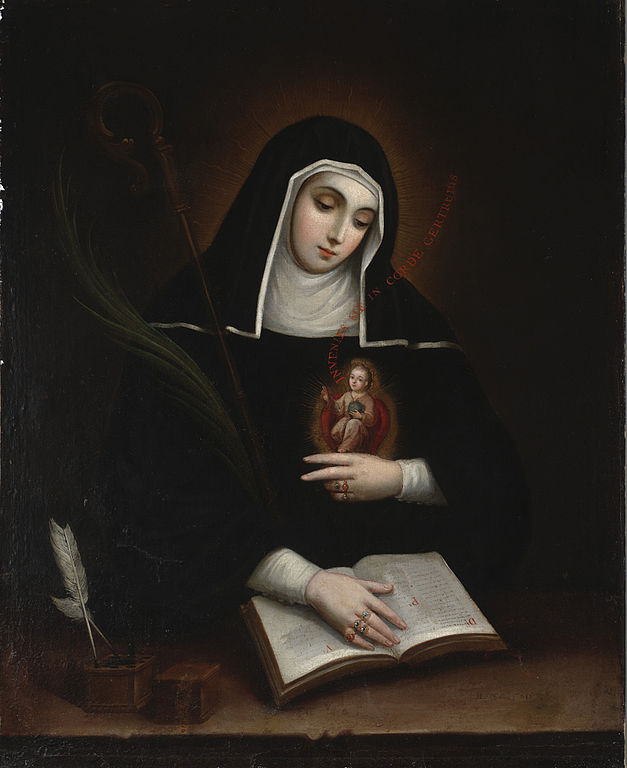Gertrude the Great
Gertrude the Great or Saint Gertrude of Helfta (January 6, 1256 – November 17, 1302) was a German Benedictine nun and mystic. She is recognized as a saint by the Catholic Church and by The Episcopal Church.
Biography
Little is known of the early life of Gertrude who was born on the Feast of the Epiphany, January 6, 1256, in Eisleben, Thuringia (within the Holy Roman Empire). At the age of four, she entered the monastery school at St. Mary at Helfta (variously described both as Benedictine and as Cistercian), under the direction of its abbess, Gertrude of Hackeborn. It is speculated that she was offered as a child oblate to the church by devout parents. Given that Gertrude implies in the Herald that her parents were long dead at the time of writing; however, it is also possible that she entered the monastery school as an orphan.
Gertrude was confided to the care of Mechtilde, younger sister of the Abbess Gertrude, and joined the monastic community in 1266.
In 1281, at the age of 25, she experienced the first of a series of visions that continued throughout her life, and which changed the course of her life. Her priorities shifted away from secular knowledge and toward the study of scripture and theology. Gertrude devoted herself strongly to personal prayer and meditation, and began writing spiritual treatises for the benefit of her monastic sisters.
Gertrude became one of the great mystics of the 13th century. Together with her friend and teacher Mechtilde, she practiced a spirituality called "nuptial mysticism," that is, she came to see herself as the Bride of Christ.
Death
Gertrude died at Helfta, near Eisleben, Saxony, around 1302. Her feast day is celebrated on November 16, but the exact date of her death is unknown; the November date stems from a confusion with Abbess Gertrude of Hackeborn. One of her biographers, Gasparo Antonio Campaccio, diligently produced his own ‘Discorso Cronologico’ (pp 154–160) on her life, stating that the exact date of her death was November 17, 1334.
Sainthood
Gertrude was never formally canonized, but a liturgical office of prayer, readings, and hymns in her honor was approved by Rome in 1606. The Feast of Saint Gertrude was extended to the Catholic Church by Clement XII and today is celebrated on November 16, the date of her death. Some religious communities, including the Benedictines, celebrate her feast on November 17, which had originally been chosen, but was already occupied by Gregory Thaumaturgus, whom Benedict XIV deemed unfit to be unseated by a woman. This is why the Pope established November 16 as her feast day.
Pope Benedict XIV gave her the title "the Great" to distinguish her from Gertrude of Hackeborn and to recognize the depth of her spiritual and theological insight.
